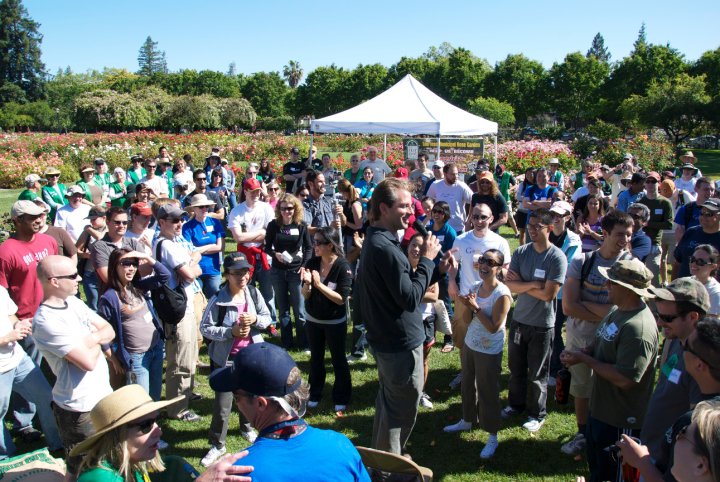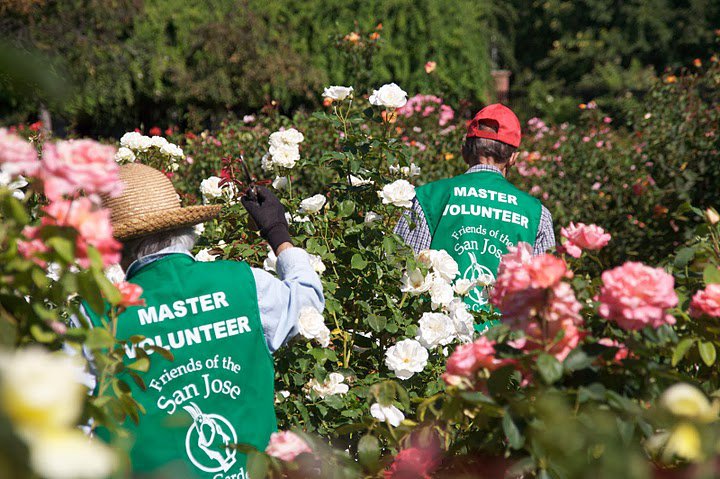Managing volunteers, arranging schedules, coordinating with supervisors and keeping track of volunteer hours can be overwhelming and time consuming, especially if you're a small nonprofit or grassroots community organization. Does it need to be so complicated? Is it possible to eliminate endless piles of paperwork and massive miscommunication?
In 2005, the San Jose Municipal Rose Garden, a free, public space in the heart of Silicon Valley, was placed on probation with the All-American Rose Selections (AARS). Budget cuts had left the space in a state of decline. Today, the fragrant garden is thriving; over 3,000 people volunteer to keep it well maintained and operating smoothly. In 2010, it won the AARS “America’s Best Rose Garden” competition. How did this patch of neglected shrubs manage to bloom again?
Friends of the San Jose Rose Garden
In late 2007, Terry Reilly and Beverly Rose Hopper founded the Friends of the San Jose Rose Garden (FSJRG). In 2008, the AARS decided to keep the garden in their program; evaluators noticed that the beds were finally being properly pruned and weeded and that plant disease was being controlled. FSJRG’s methods merit some attention: successful recruitment and management of volunteers, media engagement and an adept use of the web.
Self-Tracked Volunteer Hours for Social Currency
Reilly and Hopper began putting out the call for volunteers. San Jose Mercury News and other local media platforms told the story through ongoing coverage. Getting volunteers to show up was FSJRG’s first challenge; managing and retaining a base of willing participants was the next step. They set up an internet based system so volunteers could track their own hours and be recognized amongst their peers for the work they did. In the beginning, the means of tracking volunteer time involved a coordinator receiving hours and manually entering them into a database.
In August of 2010, FSJRG began using Track it Forward, an online volunteer tracking system. This tool allows volunteers to log their hours themselves. The information shows up instantly as aggregated, public data for everyone from FSJRG to see. This data transparency and instant feedback on individual contributions is a different approach from the norm. Click here to see their Track it Forward site and all the work that is still being done!
Since starting with Track it Forward, FSJRG has seen an increase in volunteer participation and retention - volunteers seem to commit to the project and have more ownership over what they contribute when they can see the results of their efforts instantly added to the site.

Skillful Use of Social Media and Web
Efforts to build this vibrant community of rose aficionados involved a smart web strategy. FSJRG has an active Facebook page. Moderators pose questions to engage dialogue; volunteers are recognized in status updates and photo albums; accomplishments and events are announced and a range of blossom types are artfully captured and shared.
The FSJRG website is an achievement in and of itself. The site features regular blog postings, an interactive Google map of the garden, a mash-up Yahoo map which illustrates where the volunteers are from, an impressively documented FSJRG history lesson, an embedded version of Track it Forward for logging hours and plenty of instructional videos.

Empowered Volunteers
San Jose Rose Garden volunteers are empowered in many ways. When a participant reaches 100 hours of donated time, they are given a City Commendation sign by the Mayor and City Council member.
The Master Volunteer Certificate program provides a workshop to sharpen horticultural skills. After completing the 5 hour training and probation period, Master Volunteers are provided a stylish green vest to identify them in the garden, and they are able to log their hours themselves.
Video tutorials on everything from removing “suckers” (nutrient-robbing stems near the plant’s root), pruning, planting and dead heading also enhance volunteer expertise.
Streamlining internal processes, wise use of web technology, skill-building and recognizing volunteers are all crucial aspects of volunteer retention and community project sustainability. The San Jose Municipal Rose Garden has proven that cultivating a loyal volunteer community is possible, despite thorny obstacles.
 Last updated by
Last updated by